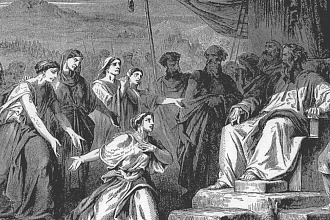Parasha for the Week: Ki Tisa: Exodus 30:11 – 34:34
Haftarah for the Week: 1 Kings 18:1 - 39
Besorat Yeshua: Mark 15:28 - 41
Overview
Moshe conducts a census by counting those who gave a half shekel to the temple.
Moshe is commanded to make a copper laver for the Mishkan. The people donate the metal.
The formula of the anointing oil is specified, and G-d instructs Moshe to use this oil only for dedicating the Mishkan, its vessels, Aharon and his sons.
G-d selects Bezalel and Oholiav as master craftsmen for the Mishkan and its vessels.
The people are commanded to keep the Sabbath as an eternal sign that G-d made the world.
Moshe receives the two Tablets of Testimony on which are written the Ten Commandments.
The mixed multitude who left Egypt with the Jewish People panic when Moshe's descent seems delayed, and force Aharon to make a golden calf for them to worship.
G-d tells Moshe to return to the people immediately, threatening to destroy everyone and build a new nation from Moshe.
When Moshe sees the camp of idol-worship he smashes the tablets and destroys the golden calf.
The sons of Levi punish the transgressors, executing 3,000 men.
Moshe ascends the mountain to pray for forgiveness for the people, and G-d accepts his prayer.
Moshe sets up the Mishkan and G-d's cloud of glory returns.
G-d tells Moshe to make new tablets.
Idol worship is prohibited.
The laws of Pesach, the first-born, the first-fruits, Shabbat, Shavuot and Succot are taught.
When Moshe descends with the second set of tablets, his face is luminous as a result of contact with the Divine.
"Love For Wisdom"
The Torah states, "And in the heart of each person who had a wise heart I have given wisdom" (Exodus 31:6). Why does the Torah make having a wise heart a prerequisite for the Almighty granting wisdom? Rabbi Chaim Shmuelevitz, Rosh Hayeshiva, teaches that from here we see that a person needs wisdom to merit acquiring wisdom. What is this wisdom? It is the heartfelt desire for more wisdom! We can have a picture of what this desire is from the desire of Haman (in the Purim story) for honor. He was second to the king in power and the entire population of 127 countries bowed to him. Nevertheless, when Mordechai refused to bow down to him, he
said that all his honor was as nothing since he was missing one person's honor. So, too, a
person who has a deep love of wisdom feels a strong lack for any wisdom he is missing. When
you have this love for wisdom, the Almighty will give you greater wisdom!
"Put Aside Personal Prejudice"
After descending from Mt. Sinai with the Ten Commandments, Moses saw the people dancing
around the Golden Calf. The Torah relates: "And Moshe stood at the gate of the camp and he
said, 'Whoever is for the Almighty come to me.' And all of the descendants of Levi gathered
unto him." (Exodus 32:26) We should put aside personal prejudice and philosophical
differences if we are called upon to take action for the Almighty, for God's people or any
righteous cause!
"Counting the People of Israel"
G-d tells Moshe that when counting the people of Israel, instead of counting them directly, each
one should contribute a "half Shekel." By counting the amount they contributed, Moshe would
have the exact count of the Jewish people. Why did G-d command that they be counted through
giving a half Shekel and not by counting the people? By counting those who gave he was able
to ascertain who he could count on. Where our treasure is there our heart is.
"Providing Food for the Poor"
Rabbi Yitschak Elchanan Spector, was once collecting charity to provide food and wood for
heating for the poor. He came to the home of one of the wealthy people in his community, who
was also a Torah scholar. Rabbi Yitzchak Elchanan told him the reason for his coming and
asked for his contribution. The wealthy man gave a small donation. When the rabbi remarked
how small the sum was compared to what he could afford to give, the wealthy man replied, "As
you know I spent much of my time studying Torah. This is my contribution to our community.
Let other wealthy people, who don't study Torah, help fulfill this community mitzvah."
The rabbi, showing his disappointment, replied, "Your answer reminds me of the following
story; During the Russian-Japanese war, every Russian citizen was called to contribute a
minimum of ten rubles to the war chest.
Officers of the Czar came to collect money from the citizens of one of the villages. Everyone
gathered in the town hall and the officers told them how important it was to take part and
contribute a minimum of ten rubles. One after the other the peasants announced their
contributions of ten rubles. One poor peasant, however, got up and announced that he is giving
100 rubles! Everyone was shocked.
"How can you manage to give such a large sum?" he was asked.
The peasant explained, "A while ago I was brought before a judge and fined ten rubles. When I
told the judge that I didn't have the money, he sentenced me to a month in jail. Now, I figured if
a month in jail is worth 10 rubles, then 10 months in jail should be worth 100 rubles! I'm ready
to sit 10 months in jail which should count as my contribution of 100 rubles to the Russian
army!" Upon hearing this everyone in the room burst out laughing.
"The same is with you", concluded Rabbi Yitzchak Elchanan. "Your studying Torah will help
the poor of our city like that peasant's sitting in jail will help the Russian army! True, studying
Torah is very important, but it will not make one needy person less hungry or warmer during
the winter. One cannot excuse himself from giving charity by opening a Torah. One must open
his pockets and give!"
"This is also the lesson from Parasha Ki-Tisa," continued the rabbi. "When it came to count His
people G-d told them to give a half-Shekel coin. This teaches us that in order for a believer to
be counted one must give and contribute!"
Haftara: 1 Kings 18:1 - 39
Parasha: Israel experienced a great apostasy in the time of Moses. "Ex. 32:4 He took what they handed him and made it into an idol cast in the shape of a calf, fashioning it with a tool. Then they said, "These are your gods, O Israel, who brought you up out of Egypt." (Exodus 32:4).
Haftara: Israel Experienced a great apostasy In the time of the prophet Elijah: 'So they took the bull given them and prepared it. Then they called on the name of Baal from morning till noon. "O Baal, answer us!" they shouted. But there was no response; no one answered. And they danced around the altar they had made. " (1Kings 18:26)
The people of Israel was under the domination of Jezebel, an evil queen and Ahab, a weak king. Jezebel killed many prophets of God and some of them are protected by Obadiah the governor.
Elijah challenged king Ahab: "As the LORD Almighty lives, whom I serve, I will surely present myself to Ahab today." (1Kings 18:15). What is strange in this story is that the one who is faithful, Elijah, is accused by the king as the troubler in Israel: "When he saw Elijah, he said to him, "Is that you, you troubler of Israel?" (1Kings 18:17) Ahab is the one who brought idolatry to Israel, but he is so blind that he does not see anymore where is the problem. Elijah does not hesitate to say the truth to the king "But you and your father's family have. You have abandoned the LORD's commands and have followed the Baals." (1Kings 18:17)
"Would that every minister might realize the sacredness of his office and the holiness of his work, and show the courage that Elijah showed! As divinely appointed messengers, ministers are in a position of awful responsibility." (PK 149).
Besorat Yeshua: Mark 15:28 - 41
Parasha: Israel experienced a great apostasy in the time of Moses: "He took what they handed him and made it into an idol cast ... Then they said, "These are your gods, O Israel, who brought you up out of Egypt." (Exodus 32:4).
Haftara: Israel experienced a great apostasy in the time of Elijah: 'So they took the bull given them and prepared it. Then they called on the name of Baal from morning till noon. "O Baal, answer us!" (1Kings 18:26)
Besorah: Israel experienced a great apostasy in the time of Yeshua: "In the same way the chief priests and the teachers of the law mocked him among themselves. "He saved others," they said, "but he can't save himself!" (Mark 15:29-31).
The text of the Besorah has a clear link to the text of the Haftara, which is about Elijah, Yeshua says on the cross "Eloi, Eloi, lama sabachthani?" (Mark 15:34). Some people did not hear what he said very well thus they said, "Listen, he's calling Elijah." (Mark 15:34). The Jewish people were waiting for the coming of Elijah just before the coming of the Messiah (Malachi 4:5). The four gospels contain the name of Elijah twenty-six times.
Yochanan Hamatbil (John the immerser) was Elijah: "And if you are willing to accept it, he is the Elijah who was to come" (Matthew. 11:14), later he said: "But I tell you, Elijah has already come, and they did not recognize him" (Matthew. 17:12). Yochanan had the same courageous attitude of Elijah, he did not hesitate to say to king Herod the truth. 'For Yochanan had been saying to Herod, "It is not lawful for you to have your brother's wife." ' (Mark 6:18). Herod killed Yochanan, He was beheaded by the king. However, his mission, to prepare the coming of the Messiah, was fulfilled.















